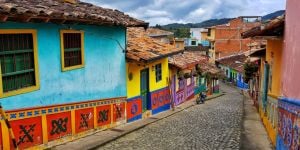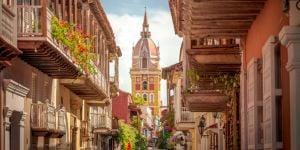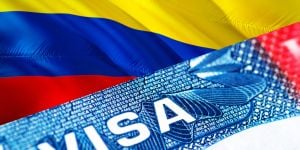Steps to create Colombian Power of Attorney
Given the COVID situation, I am unable to enter Colombia to redeem a bank certificate of deposit (CDT fisico).
I have heard from one source that i need to travel 4 hours to the nearest Colombian consulate to register my signature before they will issue an online apostille for my one-page document. I'm hoping there is a more expedient way.
I have a trusted friend in Colombia, so i don't think lawyer should be required to perform this simple transaction.
Can anyone say the most straightforward steps?
See also
Banking and finances in ColombiaAdvertising Agencies in ColombiaPublic Relations & Marketing Consultants in ColombiaBank ATM with best exchange rate for the us dollar?The US Dollar Vs. The Colombian Peso ............. Who's Up? Who's Down?Taxation in Colombia for a dual U.S. and Colombian citizen.Debit card denial in colombian for colombian wifemattmax wrote:Given the COVID situation, I am unable to enter Colombia to redeem a bank certificate of deposit (CDT fisico).
I have heard from one source that I need to travel 4 hours to the nearest Colombian consulate to register my signature before they will issue an online apostille for my one-page document. I'm hoping there is a more expedient way.
I have a trusted friend in Colombia, so i don't think lawyer should be required to perform this simple transaction.
Can anyone say the most straightforward steps?
The original post appears to have too many parts to elicit a reliable solution from us laymen Expats.
"Power of attorney .. bank certificate of deposit .. register my signature .. online apostille .. one page document...."
Consider these steps....
1. Phone/email the consulate you mentioned and ask for a written/emailed list of to-do's.
2. Via email, ask a couple of attorneys for a gratis concept on how to proceed. Let them attempt to make a case for why you need or don't need an attorney or notary.
OP, if you post again, kindly share why you titled this "....Power of Attorney" and whether there is reason to believe you need a POA in order to redeem your certificate of deposit.
cccmedia
Thanks cccmedia for the guidance. I contacted the Colombia consulate, and they cleared up some of my confusion above. The two options they provided:
1) make appointment and travel to the Colombian consulate where they will do a signature recognition/notarization (not an apostille) on the limited power of attorney document written in Spanish. There is no need to do an apostille, it is the same as going directly to a Colombian notary.
2) notarize and obtain apostille in my particular US state of the English version of the document. I believe a Certified translation to Spanish can be done either before or after.
In both cases, the document must be physically mailed to Colombia to be presented in Spanish at the bank branch.
It is a good point as to whether i actually need a power of attorney to redeem a physical CD. To me it seems that the 'letter of authorization' is basically the same as a 'special/limited power of attorney'. The key is that it must be notarized. If the notary is not Colombian, then also apostilled by the state in which the document was notarized to be recognized among member countries internationally.
Here are the official terms of the bank:
"Si tienes un apoderado: documento de identificación original del apoderado, carta de autorización firmada por el titular y autenticada ante notario. Esta carta debe contener nombre, apellidos, número del documento de identidad de la persona autorizada y especificación de la transacción autorizada. Ten en cuenta que la vigencia máxima de esta carta es de seis meses."
https://www.grupobancolombia.com/person … s/fisicos/
Needless to say, i will never get another physical CD!
mattmax:
"[T]he document must be physically mailed to Colombia to be presented in Spanish at the bank branch."
----
The government-operated mail service of Colombia historically has been unreliable in the delivery of important documents .. and your CD and supporting documents qualify as such.
Consider using DHL or another reliable delivery service to get the CD etc. from your location to the bank or trusted intermediary.
cccmedia
mattmax wrote:2) notarize and obtain apostille in my particular US state of the English version of the document. I believe a Certified translation to Spanish can be done either before or after.
The lack of total certainty in this detail is not passing the smell test.
I suspect that any required translation must be performed in the correct sequence. Highly suggested: obtain total clarity on this point from the consulate or trusted counselor.
cccmedia
Luckily the CD is in Colombia with the representative, so it is only a single-page letter of authorization to be sent. Worst case scenario if the document never arrives, the CD simply renews for another term.
This is what the consulate said about option #2:
If you can not come to the consulate, you can sign the document at a local notary in North Carolina and then get the apostille in that State. https://www.sosnc.gov/divisions/authent … rtificates
After getting the apostille from North Carolina you can send the document physically to Colombia. In Colombia the foreign document must be accepted according to the Apostille Convention previously explained.
Once in Colombia, a foreign apostilled document can be translated to Spanish by an official translator registered with the Ministerio de Relaciones Exteriores. That is my current understanding per communication with the consulate and bank, but let me know if that doesn't smell right to anyone here.
Hi Guys...my situation is kind of similar but some guidance will help. I am living in Chile but planning to buy an apartment as an investment in Colombia along with a friend (50%-50%). He's a trusted friend and hence I would like to give him a power of attorney so that he can take care of the signing of contract with the builder as well as signing document with the bank on my behalf. Correct me if I'm wrong:
1. Send an email to Consulate and explain the above.
2.Get an appointment with Colombian consulate in Chile
3. Get the notarization done in the consulate on the simple printed piece of paper detailing the powers granted. This will be in Spanish.
4. Mail this physical notarized letter to Colombia.
Am I missing here something ? Please let me know.
ank707 wrote:I am living in Chile but planning to buy an apartment as an investment in Colombia along with a friend (50%-50%). He's a trusted friend and hence I would like to give him a power of attorney so that he can take care of the signing of contract with the builder as well as signing document with the bank on my behalf....
1. Send an email to Consulate and explain the above.
2. Get an appointment with Colombian consulate in Chile
3. Get the notarization done in the consulate on the simple printed piece of paper detailing the powers granted. This will be in Spanish.
4. Mail this physical notarized letter to Colombia.
Am I missing here something ? Please let me know.
Yes, you are missing something or some things. However, don't depend on layman Expats to tell you everything you are missing.
If you go ahead with this, use a recommended Colombia attorney who works with Expats, obtaining his or her counsel via phone or email while you are outside La República.
I would wait until I was in-country before initiating the process. When will you be in Colombia? Where is the property? Have you seen the area beyond photographs?
If you post here again, please tell us why you would initiate such a project, which will be complicated .. and may be fraught at multiple points -- especially after committing to it.
cccmedia
ank707 wrote:I am ... planning to buy an apartment as an investment in Colombia along with a friend (50%-50%). He's a trusted friend and hence I would like to give him a power of attorney so that he can take care of the signing of contract with the builder as well as signing document with the bank on my behalf.
Is this a pre-construction investment or will the builder you mention be renovating an existing apartment?
Pre-construction investments are not recommended for new arrivals in South America.
cccmedia
It's a new construction. 12 apartment construction in Chico Norte. Break even will reach at 6 apartments and then construction will start. Delivery is planned for March-2022. 4 have been sold. CUOTA INICIAL, the 30% of the value will be in 15 installments and these will be in a mutual funds managed by Banco de Bogota. Me and my friend will be 50-50% investors. He had already talked with bank and they said they can open a mutual fund for me just with passport.
Does it still sounds bad ? Kindly guide.
Do you know the name of the development? And the name of the development company? I'd certainly want to know what other projects they have developed, and if they were actually delivered on time, or at all. It is not uncommon for projects to remain unfinished for years beyond the promised date.
Here's links to several projects under development in Chicó. Is it one of these?
http://www.icrconstructora.com/catalogo-de-proyectoshttps://www.vivendo.co/proyectos-vivien … casa-chico
I bought a pre-construction condo in Centro Histórico, Quito, in 2005 in an anticipated 80-unit complex. Payment was in cuotas.
Developer ownership changed twice during pre-construction and construction. Progress was molasses slow.
The unit was finally made available to me in July 2013 when I took possession.
I was supposed to get an $8,000 rebate if the project missed its completion deadline. However, it would have cost me about $3,000 to pay for the future-tenant legal work to obtain this multa. Instead, I accepted an indoor parking space as compensation. However, when the ownership changed hands, the new owners didn't honor the parking-space deal that my attorney had arranged.
Years of waiting amid slow-slow progress was wearying. I was mostly outside Ecuador during these years.
It turned out that the developer had installed cheap, sub-standard water heaters in the units. In my case, this resulted in inadequate hot water in the bathroom shower .. and, three months in, the apartment was 70 percent flooded when the heater spontaneously burst while I was out shopping, causing water to gush out throughout the apartment. Other owners' units were similarly affected, according to my conserje (superintendent).
Unless an Expat is willing to put up with years of delays and unexpected problems, pre-construction projects are often a bad idea in South America.
cccmedia
Just wanted to let folks know that i was able to liquidate my certificate of deposit (CDT) with Bancolombia using the following steps:
1) Wrote a single-page 'Letter of Authorization' with English in the left column and Spanish translation in the right column (see example linked below). This eliminated the need to have certified or notarized English translation of the document since both languages appear side-by-side.
> Example Letter of Authorization
2) Notarized the document at a registered notary within my state. Although she was bilingual, all she cared about was confirming my signature matched my ID and recording the transaction in her ledger book. ($8 USD)
3) Sent notarized document, cover letter, US bank check, pre-paid envelop to my Secretary of State in NC. ($10 USD)
4) The document with apostille was returned to me in approximate 1 week. I mailed the document via Priority Mail International® Flat Rate Envelope, 10 business days. I don't recommend sending anything without a tracking number. ($33.75 USD).
5) Upon receiving the Letter of Authorization, my friend went to Bancolombia where they scanned/reviewed the document and gave her a confirmation ticket. She then presented ticket and document to the bank rep on the day of the CD maturity along with the CD registration to liquidate the investment.
Hope this saves someone from stress and fees charged by anyone who says this must be done via attorney. It worked for me, just allow plenty of time given the irregular schedules due to government restrictions. If you have a personal contact at your bank branch, it can't hurt to give a call in advance with a heads up as to what you intend to do.
Make your relocation easier with the Colombia expat guide

Childcare, family activities and education in Colombia
Family is extremely important to Colombians and many expats find it a great place to raise children. Colombia ...

Finding work in Colombia
Though the economy in Colombia is continuing to grow, it can be difficult for foreigners to find work. That said, ...

Accommodation in Colombia
As long as you know what to expect, finding and securing accommodation in Colombia isn't too difficult. Demand ...

Leisure activities in Colombia
Both visitors and those who stay long term in Colombia will have no shortage of things to do. Colombia's rich ...

The Working Holiday Visa for Colombia
What makes Colombia unique is that it is one of the most diverse countries in the world, bordered by two oceans ...

Visas for Colombia
There are 3 types of visas for foreigners who wish to live in Colombia. If you are planning to stay in Colombia ...

Travelling to Colombia
Foreigners visiting or moving to Colombia should research all the requirements well in advance of travel. For a ...

Travelling around Colombia
Most Colombians live in urban centers and do not own cars. That said, expats living in large or mid-size Colombian ...
Forum topics on banking in Colombia






